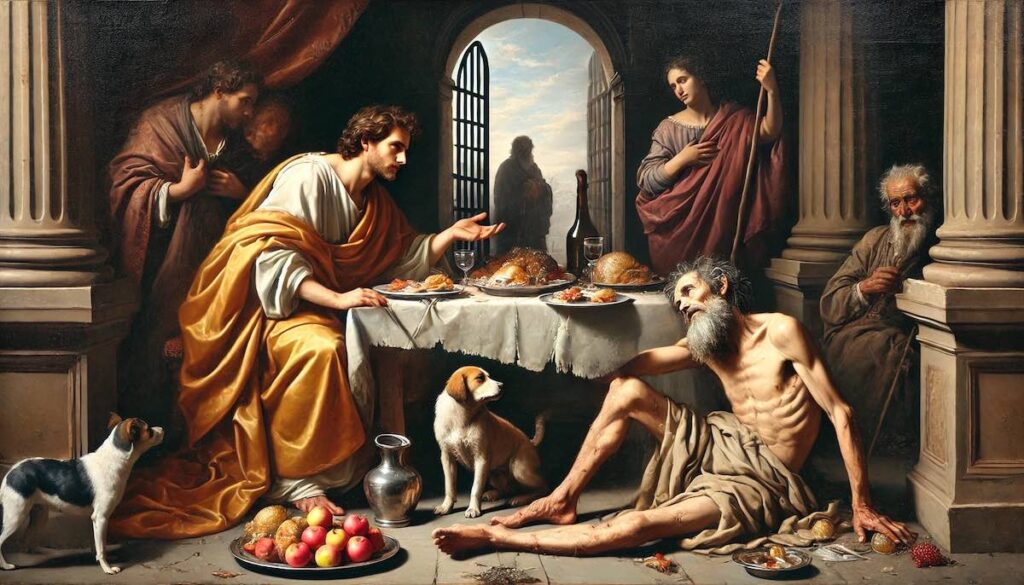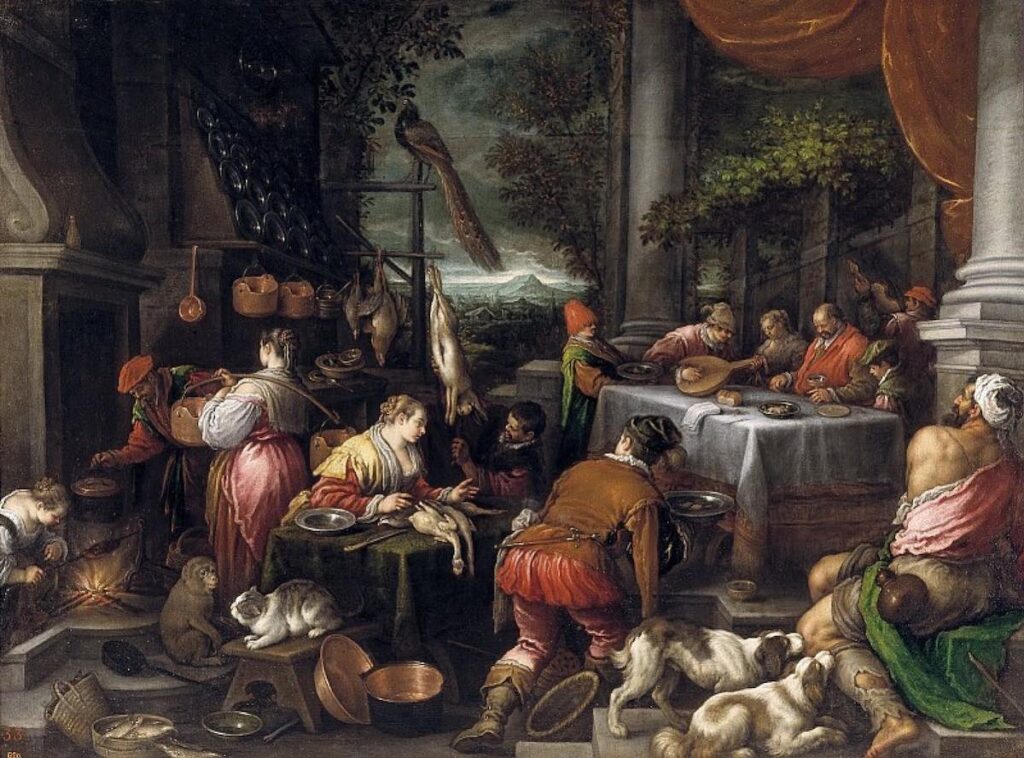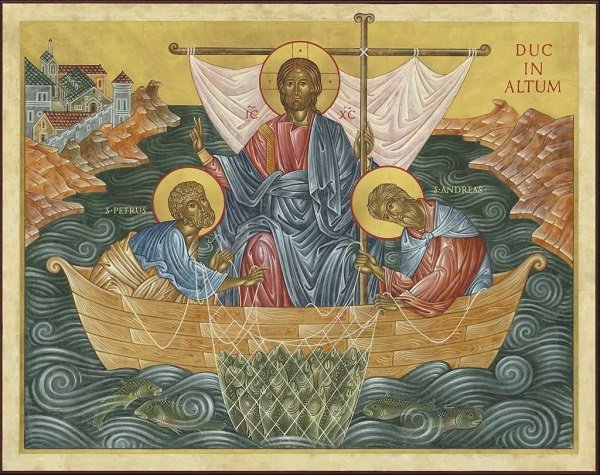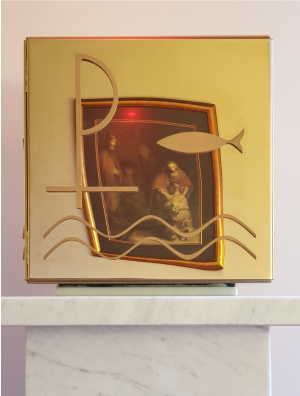The Eternal Message of the Rich Man and Lazarus
The parable of the rich man and Lazarus offers a stark warning about the dangers of wealth and the eternal consequences of neglecting the poor. Through this story, Jesus contrasts the lives of two men: one who lives in luxury without compassion and another who suffers in poverty but finds comfort in the afterlife. As Benedict XVI reflects, the parable is not just about material wealth but about spiritual blindness and the ultimate awakening to eternal truth. It challenges us to reconsider our priorities, our treatment of the vulnerable, and our understanding of true wealth.
The Rich Man: A Life of Self-Indulgence
In the parable of the rich man and Lazarus (Luke 16:19-31), Jesus introduces us to a rich man who “was clothed in purple and fine linen and who feasted sumptuously every day” (Luke 16:19). His life is marked by excess and self-indulgence, with no regard for the suffering of those around him. In contrast, Lazarus, a poor man covered in sores, lies at the rich man’s gate, longing for the crumbs from his table (Luke 16:20-21).
Benedict XVI points out that the rich man’s sin is not merely his wealth but his complete disregard for the needs of Lazarus. He is blind to the suffering right outside his door, living in a bubble of luxury and comfort. This blindness to the needs of others is a recurring theme in Jesus’ teachings, and it serves as a warning to all who prioritise material wealth over spiritual responsibility.
The rich man’s life is a symbol of spiritual poverty, despite his material abundance. His failure to see Lazarus is ultimately a failure to recognise his own moral and spiritual obligation to care for the vulnerable. In this, the parable echoes Jesus’ broader message about the dangers of wealth when it becomes an idol, separating us from compassion and justice.
Lazarus: A Life of Suffering and Eternal Comfort
Lazarus, by contrast, represents the suffering and marginalised. His presence at the rich man’s gate symbolises the cries of the poor that go unheard by the powerful and wealthy. In life, Lazarus is ignored and neglected, but in death, he is carried by angels to “Abraham’s bosom” (Luke 16:22), a place of eternal comfort.
Benedict XVI draws a parallel between Lazarus and the righteous poor mentioned in the Psalms. Psalm 73, in particular, reflects on the seeming prosperity of the wicked and the suffering of the just. However, the psalmist ultimately finds comfort in the knowledge that true justice and comfort are found in God’s presence. Similarly, Lazarus’ reward is not in this life but in the next, where he is embraced by God.
This part of the parable highlights the reversal of fortunes that characterises much of Jesus’ teaching. “The last shall be first,” Jesus often said, and in this parable, the poor man who was last in life is now first in the Kingdom of Heaven. Lazarus’ story reminds us that God’s justice transcends worldly circumstances, and the true measure of a person’s life is not material wealth but spiritual richness.
The Great Reversal: Judgment and Eternal Consequences
The most dramatic moment in the parable of the rich man and Lazarus occurs after both men have died. The rich man finds himself in torment in Hades, while Lazarus is comforted in Abraham’s bosom. In his suffering, the rich man pleads with Abraham to send Lazarus to cool his tongue, but Abraham replies that a “great chasm” has been fixed between them, making it impossible for the two realms to interact (Luke 16:26).
Benedict XVI reflects on this “great chasm” as a symbol of the irreversible consequences of the rich man’s choices in life. His failure to show compassion has led to eternal separation from God’s grace. The chasm also represents the spiritual distance between the rich man and Lazarus in life—a distance that could have been bridged through acts of mercy but now remains impassable.
This reversal of fortunes serves as a powerful reminder that our actions in this life have eternal significance. The rich man’s request for a drop of water, a simple act of mercy he denied Lazarus in life, is denied to him in death. This moment encapsulates the theme of justice that runs throughout the parable: those who ignore the suffering of others will face the consequences of their neglect in the afterlife.
A Call for Repentance: The Request for a Sign
In the final part of the parable of the rich man and Lazarus, the rich man asks Abraham to send Lazarus to his family to warn them of the consequences of their actions. He believes that if someone from the dead warns them, they will repent. However, Abraham’s response is clear: “If they do not hear Moses and the prophets, neither will they be convinced if someone should rise from the dead” (Luke 16:31).
Benedict XVI draws a connection between this request and the Pharisees’ demand for signs during Jesus’ ministry. Like the rich man, they sought proof of Jesus’ authority, yet they remained unmoved by his teachings and miracles. Jesus’ response to both the Pharisees and the rich man is the same: faith does not come through signs but through a heart open to God’s word.
This request for a sign also points forward to the resurrection of Jesus. Even after Jesus rose from the dead, many still refused to believe. The parable underscores the importance of repentance and faith, warning that the opportunity to respond to God’s call should not be delayed.
The Rich Man, Lazarus, and the Call to Justice
The parable of the rich man and Lazarus challenges us to examine how we use our wealth and how we respond to the needs of others. It serves as a stark reminder that our actions—or inactions—towards the vulnerable have eternal consequences. As Benedict XVI reflects, this parable is not only about wealth but about spiritual blindness and the urgency of repentance.
Through the figures of the rich man and Lazarus, Jesus teaches us that true wealth is not measured in material possessions but in love, compassion, and justice. The parable calls us to open our eyes to the suffering around us and to act with mercy, knowing that in doing so, we respond to the heart of God’s call for justice.
See the other chapter reviews of the first volume on Jesus of Nazareth here.




